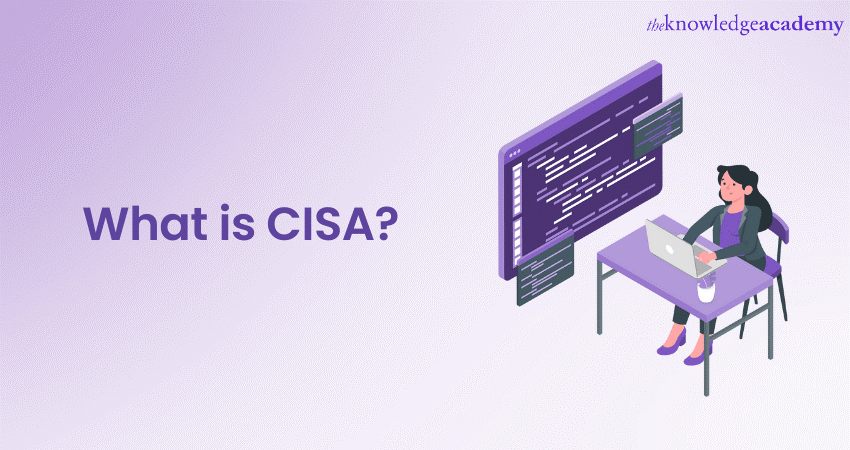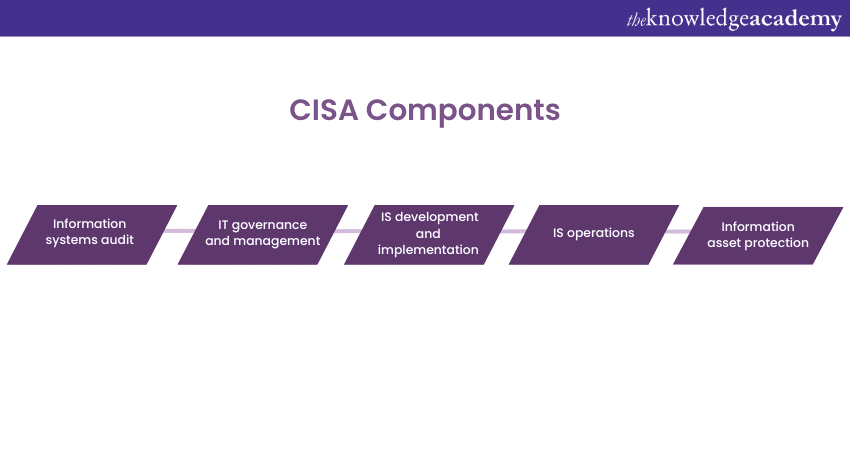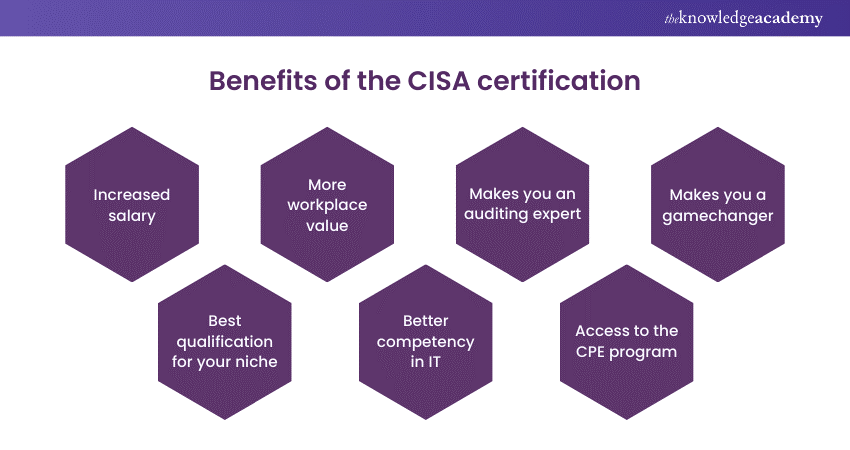We may not have the course you’re looking for. If you enquire or give us a call on 01344203999 and speak to our training experts, we may still be able to help with your training requirements.
Training Outcomes Within Your Budget!
We ensure quality, budget-alignment, and timely delivery by our expert instructors.

What is CISA? Well, it is a certification issued and awarded by the Information Systems Audit and Control Association (ISACA). It is a globally recognised standard against which IT skills of an auditor are evaluated.
This blog will give you a detailed insight into What is CISA and the way you should prepare for its associated exam. You’ll also learn about the roles and responsibilities of a CISA professional. Read along to learn more! .
Table of Contents
1) Understanding What is CISA?
2) Benefits of the CISA certification
3) What are the requirements for the CISA qualification?
4) How to become a Certified Information Systems Auditor
5) Career scope for CISA-certified professionals
6) How long does it take to become a Certified Information Systems Auditor (CISA)?
7) What does a Certified Information Systems Auditor do?
8) Conclusion
Understanding What is CISA?

CISA is a globally reputed industry-standard certification demonstrating an IT Auditor’s skills in evaluating Information Systems (IS). IT professionals who monitor, manage and protect Information Systems (IS) for organisations are recognised by the ISACA through this certification.
Furthermore, the certification is also provided to companies, but only after it has proven the security of its Information Systems. The ISACA is responsible for regulating IT controls and ensuring that IT system vulnerabilities are addressed. The ultimate goal of ISACA’s regulation is to protect information infrastructures from cyber-security threats.
The knowledge of CISA is categorised into five job domains, each of which covers a different feature of auditing systems. Prospective candidates must be well-versed in all five domains as the first step to being awarded the credential. They can then proceed to attempt the CISA examination. The five domains are as follows:
1) Auditing Information Systems: The audit process involves planning, conducting and reporting the audit of an organisation’s Information Systems.
2) IT governance and management: The CISA professional is responsible for managing and evaluating the organisation’s IT department. The evaluation includes its structures, procedures and policies.
3) Development and implementation of IS: CISA-certified professionals generally act as Project Managers while implementing an organisation’s IT systems.
4) Operation of Information Systems: One of the major roles of a CISA professional is to maintain and support the implementation of an organisation’s Information Systems.
5) Protection of Information Assets: The CISA professionals should be capable of identifying and recommending the best practices which appropriately address cyber risks.

Responsibilities under CISA
There are several important responsibilities that organisations need to practise to get CISA-certified. Here is a list of the responsibilities:
1) The design and implementation of audit strategies based on in-depth knowledge of Risk Management.
2) The determination of an organisation’s protection levels on its IT assets.
3) Execution of the audits that correspond to the company's business objectives being under audit.
4) Presentation of the audit results and recommendation of business solutions based on the results.
5) An organisation’s improvements are measured based on CISA recommendations by revisiting previous audits.
Benefits of the CISA certification
The CISA certification is awarded to professionals to help them demonstrate their capabilities with advanced IT systems to prospective clients and employers. It is an industry-standard widely demanded by enterprises all around the globe and generally a mandate for auditing the security of Information Systems.
The many benefits of being CISA certified include the following:

1) Increased salary: Professionals accredited with the CISA certification can earn an average annual salary between GBP 39,000 and GBP 75,000 according to Glassdoor. This salary range is considerably higher than their non-certified industry parallels. Individuals keen to earn a more competent salary can leverage their employability with the certification.
2) More workplace value: Certified professionals gain the knowledge, skills and business confidence with this accreditation, significantly enhancing workplace performance. They are immediately perceived as better within their organisation.
3) Makes you an IT Auditing expert: The need for increased accounting operations through Information Systems translates to a higher demand for certified CISA Auditors. The previous ten years have seen more focus on internal control measures that have pushed the envelope for the demand of Auditors.
4) Makes you a game-changer: CISA puts certified professionals ahead in the race for the best prospective employers in the market. They can move past the first hurdle in IT Auditing for jobs that demand the best experts.
5) Best qualification for your niche: Professionals certified with the CISA accreditation become more specialised technical experts who can demonstrate their expertise in auditing IT systems. The certification mainly proves their commitment to the IT security industry.
6) Better competency in the IT industry: Certified professionals can showcase their CISA credentials on their online business profiles immediately after receiving the award. Their proactiveness in putting themselves in the market will attract top prospective employers.
7) Access to further CISA development program: When professionals receive their CISA certification, the accreditation translates into them getting automatic access to ISACA’s Continuing Professional Education (CPE) program. The program intended to educate such professionals further ensures they are adaptive to an evolving field.
Learn about the audit process for Information Systems by signing up for the Certified Information Systems Auditor Course now!
What are the requirements for the CISA qualification?
The CISA certification requires at least five years of relevant work experience and successful completion of a rigorous written exam. Apart from this experience, candidates require to master the five CISA domains defined by ISACA :
a) Domain 1 – Information Systems Auditing process
b) Domain 2 – Governance and management of IT
c) Domain 3 – Information systems acquisition and development
d) Domain 4 – Information systems operations and business Resilience
e) Domain 5 – Protection of information assets
Learn to secure Information Systems on the cloud by signing up for our Information Systems Security Management Training now!
How to become a Certified Information Systems Auditor?
After successfully passing their CISA examination, candidates can apply for their CISA certificate. CISA applicants need at least five years of work experience across domains like Information Systems Auditing, Control or Security.
Individuals who exhibit competency in their field are honoured with the CISA certification. In addition to passing the exam, ISACA requires an application demonstrating relevant work or educational experience. With most professional credentials, the ISACA has ethical requirements for certification holders.
CISA holders must follow these practices to maintain their licenses. As with most professional certifications, a CISA must meet continuing education standards to keep their knowledge. After obtaining the certificate, individuals must adhere to professional standards and implement institution-developed guidelines.
Accumulate professional experience
The ISACA gives CISA applicants the provision of substituting their one year of experience in Information Systems with their work in IT auditing. The other option allowed for applicants is one year of traditional auditing work experience in any Information Systems domain.
Furthermore, the applicants can also utilise a relevant university qualification instead of presenting two years of work experience. They can only leverage this benefit depending on the length of their degree. The ISACA requires that the applicant’s work experience should have occurred in the last ten years from their application date.
Additionally, holders of the CISA certificate need to participate in the ISACA’s CPE program. The program is designed to ensure CISA professionals adapt to industry standards. The CPE program has four main goals:
1) To monitor each CISA professional’s knowledge in auditing, controlling and securing Information Systems.
2) To identify the CISAs who are not technically qualified enough to keep their certification.
3) To help an organisation assemble a stable auditing team by providing suggestions on their training, development and staff selection.
4) To maintain the knowledge and capabilities of CISA by distributing new updates and releases.
Be a game changer and stay ahead in the market of employer prospects with our CISA Information Systems Auditor Course. today!
Cost of the CISA Certification
Professionals interested in attempting the CISA exam do not need to sign up for ISACA membership.
|
Fee type |
Fee subcategories |
||
|
ISACA Membership fee (optional) |
International |
GBP 108
|
|
|
Local renewal |
GBP 0 to 112 |
||
|
New Membership |
GBP 8 (online) |
||
|
CISA Exam fee |
Early bird |
Member |
GBP 419 |
|
Non-Member |
GBP 567 |
||
|
Standard |
Member |
GBP 459 |
|
|
Non-Member |
GBP 607 |
||
|
Annual Maintenance Fee |
|
Member |
GBP 32 |
|
|
|
Non-Member |
GBP 52 |
Pass the examination
CISA requires candidates to score at least 450 points to pass the examination. After their test attempt, the raw score is gathered and converted to a point scale between 200 and 800. The raw score represents the number of questions answered correctly. After the score is converted, the resultant amount represents the candidate’s potential as a CISA professional.
Since CISA does not penalise candidates for their wrong answers, they can attempt the answers more confidently, considering they have nothing to lose.
Maintain your certification
Candidates can keep their certification status active by paying maintenance fees and satisfying the requirements for the CPE program. They need to hold at least 20 contact hours each year and 120 contact hours over three years. Additionally, candidates must abide by the Code of Professional Ethics instituted by the ISACA.
Career Scope for CISA Certified Professionals
Here is a list of prospective designations for professionals awarded with the CISA certification:
1) Information Systems Analyst
2) Internal Auditor
3) Audit Manager
4) Security Officer
5) IT Consultant
6) Chief Information Officer
7) IT Risk and Assurance Manager
How long does it take to become a Certified Information Systems Auditor (CISA)?
The most natural timeline to become a CISA is five years, as the ISACA requires half a decade of skilled knowledge on your application. As part of the certification process, candidates must satisfy educational requirements and may apply for a waiver based on exceptions.
What does a Certified Information Systems Auditor do?
The role of a CISA is to supervise, administer, and safeguard a company's Information Technology systems and related departments. It involves conducting audits of processes and products, implementing risk mitigation techniques to prevent security breaches, and collaborating with other departments to meet their technology needs without compromising security or creating system vulnerabilities.
Conclusion
We hope that this blog helped aspiring professionals understand What is CISA so that they can help organisations manage their cybersecurity risks better. By employing these certified professionals, organisations learn to navigate the usage of cybersecurity frameworks with other best practices as per industry. CISAs can leverage their employability to prospective employers and clients as their credentials are an industry standard worldwide.
Acquire the knowledge of security tools and IT Audits for CISA by signing up for the CISA Training course now!
Frequently Asked Questions

CISA (Certified Information Systems Auditor) is valuable for advancing in cybersecurity. It provides a comprehensive understanding of information systems auditing, control, and security. While not the sole key, CISA certification enhances credibility, demonstrating expertise in assessing and managing cybersecurity risks.

Earning the certification demonstrates immediate commitment to cybersecurity excellence, potentially opening doors to new opportunities. However, actual career advancement depends on factors like experience, networking, and market demand. Integrating CISA into a broader skill set and leveraging it strategically can expedite success.

The Knowledge Academy takes global learning to new heights, offering over 30,000 online courses across 490+ locations in 220 countries. This expansive reach ensures accessibility and convenience for learners worldwide.
Alongside our diverse Online Course Catalogue, encompassing 17 major categories, we go the extra mile by providing a plethora of free educational Online Resources like News updates, blogs, videos, webinars, and interview questions. Tailoring learning experiences further, professionals can maximise value with customisable Course Bundles of TKA.

The Knowledge Academy’s Knowledge Pass, a prepaid voucher, adds another layer of flexibility, allowing course bookings over a 12-month period. Join us on a journey where education knows no bounds.

The Knowledge Academy offers a valuable course under CISA Training, including the CISA Certified Information Systems Auditor. These courses cater to different skill levels, providing comprehensive insights into the Top CISA Jobs Available Worldwide.
Our IT Security and Data Protection Blogs cover a range of topics related to CISA, offering valuable resources, best practices, and industry insights. Whether you are a beginner or looking to advance your IT Security and Data Protection skills, The Knowledge Academy's diverse courses and informative blogs have you covered.
Upcoming IT Security & Data Protection Resources Batches & Dates
Date
 CISA Certified Information Systems Auditor
CISA Certified Information Systems Auditor
Sat 11th May 2024, Sun 12th May 2024
Tue 28th May 2024
Sat 15th Jun 2024, Sun 16th Jun 2024
Mon 24th Jun 2024
Sat 13th Jul 2024, Sun 14th Jul 2024
Mon 22nd Jul 2024
Sat 10th Aug 2024, Sun 11th Aug 2024
Mon 19th Aug 2024
Sat 14th Sep 2024, Sun 15th Sep 2024
Mon 16th Sep 2024
Sat 12th Oct 2024, Sun 13th Oct 2024
Sat 9th Nov 2024, Sun 10th Nov 2024
Mon 25th Nov 2024
Sat 7th Dec 2024, Sun 8th Dec 2024
Mon 16th Dec 2024







 Top Rated Course
Top Rated Course


 If you wish to make any changes to your course, please
If you wish to make any changes to your course, please


